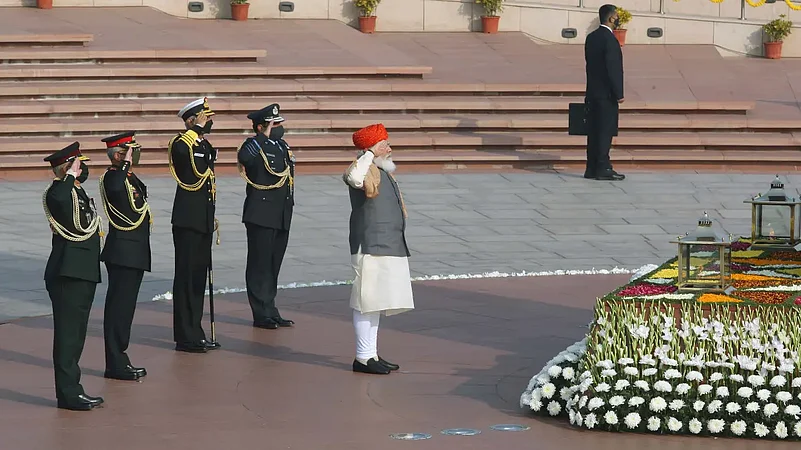The Union government on Monday amended defence laws to allow any serving or retired three-star officer under the age of 62 to be eligible for the post of Chief of Defence Staff (CDS), which means that not just four-star officers — Generals, Air Chief Marshals, Admirals — but also Lieutenant Generals, Air Marshals, and Vice Admirals can be elevated to the post of CDS.
The government issued separate notifications to amend the Air Force Act, the Army Act, and the Navy Act to make these changes.
Besides allowing three-star officers to be CDS, the notifications also said that the government may extend the tenure of the CDS as per requirements subjected to a maximum age of 65 years. Service chiefs have a tenure of three years or until the age of 62, whichever is earlier.
The post of the CDS has been vacant since December 8 when India's first CDS General Bipin Rawat died in a helicopter crash.
Here we explain the roles and responsibilities of CDS, the significance of its appointment, and the delay over the appointment.
Roles, and responsibilities of CDS
The role of the CDS has been defined as a "dual-hatted" role as CDS serves as the Permanent Chairman of the Chiefs of Staff Committee and the Secretary of the Department of Military Affairs (DMA) in Ministry of Defence.
The DMA was made within the Defence Ministry at the time the role of CDS was announced. It covers areas which were earlier covered by Department of Defence headed by the Defence Secretary. With the creation of DMA, exclusive military affairs would be overseen by CDS and DMA whereas the larger defence issues would be overseen by the Defence Secretary.
The Indian Express explains, "To give an illustrative example, this means that while tri-service military training institutions will fall under the DMA, organisations like Institute for Defence Studies and Analyses and National Defence College whose remit is broader than military matters will fall under the Department of Defence."
Besides these roles, the CDS is also tasked with the following roles:
- Principal Military Advisor to Defence Minister on all triservices issues
- Administration the Tri-Service organizations/agencies/commands
- Member of Defence Acquisition Council chaired by Defence Minister
- Military Advisor to the Nuclear Command Authority
The Nuclear Command Authority is the body that authorises the use of nuclear weapons. It has a Political Council headed by the Prime Minister and an Executive Council headed by the National Security Advisor. The decision to use weapons is taken by the Political Council and Executive Council gives its inputs. The CDS is a member of this council in an advisory role.
The CDS is also mandated with the role of inducing jointness in the armed forces, carrying out reforms, and the optimal utilisation of infrastructure.
As CDS, General Bipin Rawat was government's pointsman to create joint theatre commands in the military.
Presently, the Army, the Air Force, and the Navy have their own individual commands with overlapping areas responsibility and roles. A theatre command would mean that a particular area – a theatre – is under the command of a single officer under whom all the three services in that area would function jointly.
The delay in the appointment
The appointment of the CDS, the creation of Department of Military Affairs, and the renewed push for theatrisation were the biggest military reforms in decades ushered in by the Narendra Modi government. However, all of this is at a standstill since General Rawat's death as the old system came in place until the appointment of new CDS.
Under the old system, the senior-most service chief serves as the chairman to the chiefs of the staff committee.
As for the CDS's other roles, India Today reported that the Chief of Integrated Defence Staff would report to the service chief heading the Chiefs of Staff Committee.
It has been understood that deputies are officiating other roles of the CDS, but there is no clarity on this.
A Business Standard report said that no urgency has been shown in the appointment of new CDS because it's not an operational role and there is a frustration with the senior military leadership.
The report by Ajai Shukla said that Modi found the top military leaders unimaginative and was unimpressed by their plans.
Shukla cited a source describing an incident from 2017: "'Modi had come with the clear intention of announcing the CDS. But the pathetic level of debate [among top military leaders] indicated that the services were not ready.' At the end of the day Modi gave directions: 'The three service chiefs will stay here and talk amongst yourselves and within one month, give me six actionable points towards jointness'."
The road ahead
It has been reported that the government could soon appoint a CDS and decks have been cleared with the latest notifications amending the eligibility criteria.
Despite retired army chiefs being eligible, they are unlikely to be considered for the post of the CDS as the age to become eligible for the post has been put at 62 years, which they have already crossed.
The Print further reports that while all retired three-star officers are eligible, only "commander-in-chief" level three-star officers would be considered, which means that only officers who have held operational commands of their services will be eligible.
This could include retired officers too as commanders-in-chief level officers retire at the of 60, unlike service chiefs who retire aged 62, as per The Print.
















